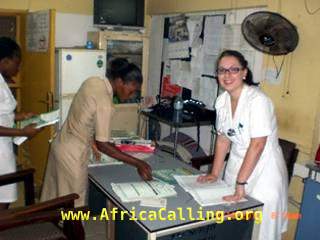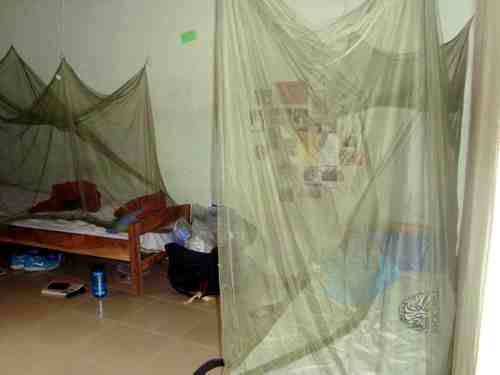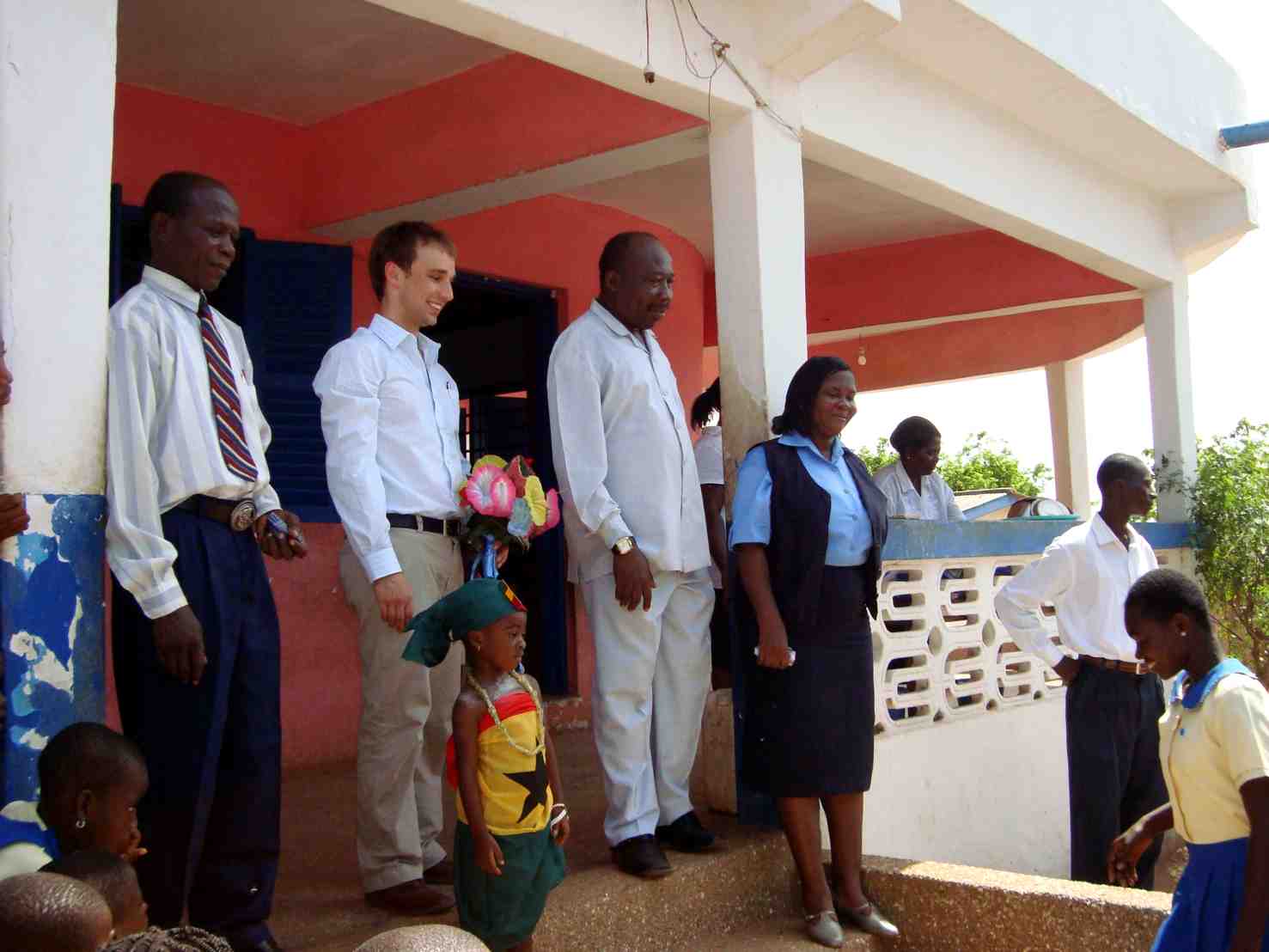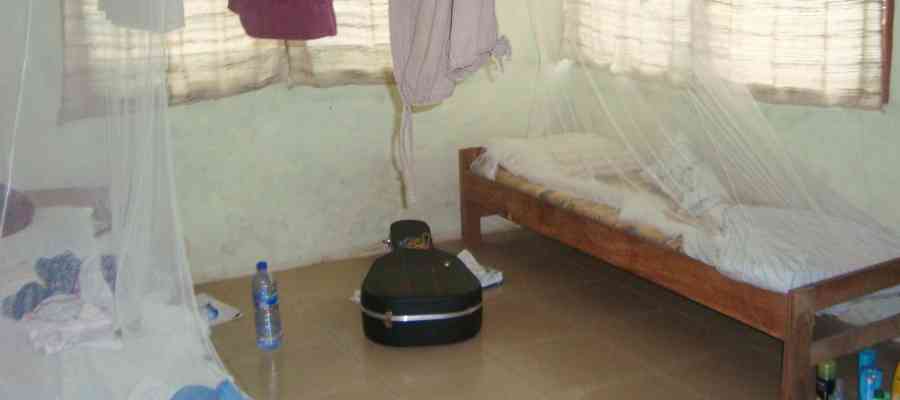Apply to volunteer in an Africa Calling construction or community program. Use the form below. Responses are usually very fast. You may be interested in what past participants have said about us.
Category: Africa Ghana Internship Programs
Volunteer Healthcare-Assistant Program Africa
- The program
- The accommodation
- The feeding
- Entertainment and sight-seeing
- Volunteers’ safety
- Minimum qualification required
- Rough estimate of total cost involved
- Apply for this program
- Next steps — after you have been accepted
- Other relevant facts about the program
- Sign up for our Newsletter
- Submit a question

The program
The volunteer-intern would assist in some or all of the following areas (in accordance with their level of relevant training): Physicians consulting room, recording patients vital signs, maternal and childcare services, treating uncomplicated illnesses, observing surgeries, pharmacy department, physiotherapy department, drafting programs to educate the public on health issues, medical outreach programs by community midwives,etc. The place of work is a community hospital, health post or teaching hospital.
Program locations: Hospitals in the Central and Western Regions of Ghana. Back to top

You will be staying with host-families. All host families live within 30 minutes of the hospital. There are always other people in the house as well; and they would be willing to provide you some assistance. Volunteers coming as a pair or couple will not be placed with other volunteers in the same bedroom. The volunteer(s) have their separate room – with a lock and key. There are two beds in the volunteers’ room; each with a mattress and in most cases a table and chair. It is advisable to bring along a mosquito net and a spare bed sheet. Many homes have a shower and flush toilet. In others you would have to manage with a bucket of water and a pit toilet – more likely in smaller towns and villages. Laundry is usually done with a couple of buckets. Back to top
View more VIGS-GHANA volunteers’ accommodations
The feeding
You will be served three meals daily. Breakfast is usually tea/ coffee/ oats or corn porridge and bread with jam/ butter/ egg omelet. Lunch could be plantain or rice or yam with vegetable stew or similar. Dinner could be rice, yam, pasta or plantain with vegetable sauce or stew or soup. For dessert you’d be served an orange or pineapple. Back to top
Entertainment and sight-seeing
Weekends are free days. You may choose to travel out of town to see the many interesting sights and sounds in other parts of Ghana or hang out with your fellow volunteer(s) and/or locals in the neighbourhood. VIGS-GHANA frequently puts together sight-seeing trips: as a volunteer on one of our programs, you’ll first be given the option to sign-on to our tours. The remaining slots will be offered to the general public. Back to top
Volunteers’ safety
Your safety is of paramount importance to VIGS GHANA. As such we give you all the relevant safety tips, plus we place you only in places where good medical services are within easy reach. In addition, we’ll give you a smart phone – so you can call or text or email or Whatsapp the in-country supervisors whenever the need arises. Our in-country support staff are on call 24 hours a day, 7 days a week. Back to top
Minimum qualification required of interns or volunteers for the program: Applicants must have successfully completed at least one year of study in a recognized institution that trains people for the healthcare sector. Back to top
Rough estimate of total cost involved
- Flight to and from Ghana: US$600-1250 (Round-trip)
- Ghana visa: US$80-170
- Vaccinations: US$150-250
- Travel Insurance: US$70-320
- Miscellaneous personal items: US$300-900
- Personal Spending money whilst in Ghana: US$200 upwards
- VIGS GHANA Program fee: starts from US$450
So, a rough estimate of the total cost for a two-week program duration would be about US$1,870 – 3,560. Check the equivalent in your currency. Back to top
Next steps — after you have been accepted
After you have been admitted to participate in the program, you would now have to execute the following:
- Book a flight. See our Ghana flight information page. The earlier you book and confirm your flight, the better.
- Go through the suggested checklist of things to do and bring and start getting (or packing) them
- Send us your flight itinerary
- 60-30 days before your departure date, you must start processing for your Ghanaian visa. VIGS-GHANA will provide you with the needed references in Ghana — which are needed to obtain a Ghanaian visa. Back to top
Other relevant facts about the program
- Minimum volunteering/internship duration: 1 week.
- Maximum duration: 6 months.
- Age range accepted: 18 – 75 years.
- We will send you a document on how to fund-raise for your trip – after you’ve confirmed your participation.
- We will meet you at the Airport in Accra (ACC) on your arrival day.
- We will give you a smart phone with internet and IDD (International Direct Dialing) capability on your arrival day.
- The average work day is 3-8 hours for this program.
- Saturdays and Sundays are free days.
- You can contact VIGS GHANA local staff on cell phones all the time — 24 hours a day — seven days a week.
- We can give you a Testimonial on successful completion of your volunteer or internship work.
- You can pay the program fee through any of the following methods:
- PayPal or debit/credit card.
- Cash installments (or full payment) upon arrival into Ghana.
Volunteer Assistant Head teacher Program in Africa
- 1. The program
- 2. The schools
- 3. Volunteer accommodations
- 4. Volunteer meals
- 5. Entertainment and sight-seeing
- 6. Volunteers’ safety
- 7. Minimum qualification required
- 8. Rough estimate of total cost involved
- 9. Next steps — after you have been accepted
- 10. Other relevant facts about the program
- 11. Apply for this program
- 12. Submit a question

The program
If you are interested in getting a different kind of managerial experience and you’ve always wanted to do volunteering job overseas, this opportunity would suit you well. Your duties as a volunteer assistant head teacher will be to assist the head teacher with the day-to-day running of the school as well as with planning and adopting strategies to improve the school in all aspects – general school administration work. Some of your other duties will be drafting newsletters and other types of everyday school correspondence, keeping a record of the income and expenditure; administering any scholarships or bursaries to beneficiary pupils; assist the head teacher to conduct parent-teacher meetings as well as outreach visits to pupils’ homes in order to get to know the pupils as well as their parents or guardians more. You’d also take a special interest in pupils who, apparently, may have one problem or other – whether it be a learning disability and/or issues at home and/or school and to impart new or alternative methods of teaching to some or all of the teachers – if you have the necessary know-how in that area. This position will task and stretch your administrative capabilities. You’ll be dealing with the teachers in the school, the pupils, their parents or guardians as well as other members of the community and possibly government education officers, district officials and perhaps staff of the Internal Revenue Service. You’d have greatly expanded your managerial prowess and general understanding of how Ghana works by the time you are through. Back to top
The schools
VIGS GHANA partner schools are located in many villages, towns and cities in the coastal belt. From Sega in the east through Prampram, Aburi, Tema, Bawjiasi, Accra and all the way to Twifu-Mampong and Takoradi in the west. We also have partner schools in the middle parts of Ghana (Kumasi). Back to top

Most of the accommodation is with carefully-selected host-families, with a couple of dedicated volunteers’ apartments. You would be placed in the same home with another volunteer — except you specifically state that you prefer to be placed alone. Volunteers coming as a pair or couple will not be placed with other volunteers in the same bedroom. Volunteer(s) have their separate room – with a lock and key. There are two beds in the volunteers’ room; each with a mattress and in most cases a table and chair. It is advisable to bring along a mosquito net and a spare bed sheet. Many homes have a shower and flush toilet. In others you would have to manage with a bucket of water and a pit toilet – more likely in smaller towns and villages. Laundry is usually done with a couple of buckets. Back to top
Volunteers’ meals
7.00am – Breakfast; 12.00pm – Lunch; 6.30pm – Dinner.
Volunteers will be fed a variety of food including indigenous African dishes such as fufu, banku, kenkey and red-red, as well as ‘foreign’ meals such as rice and pasta. Volunteers with special dietary stipulations such as vegetarianism or lactose intolerance can easily be catered for. Volunteers have to budget for their own drinking water. Bottled (as well as filtered, bagged) water is available for purchase in many parts of the village. A 1.5 liter bottle costs about US$0.85 whilst a pack of bagged filtered water (popularly known as ‘pure water’) costs about US$0.90. One pack of bagged filtered water contains twenty-five 0.5 liter pieces of ‘pure water’ sachets or bags. An alternative to buying bottled or ‘pure water’ would be to treat the tap-water with water purification tablets. Water purification tablets are not readily available in Ghana so you would have to bring some along if you intend to treat your own drinking water.
Back to top
Entertainment and sight-seeing
Weekends (Friday afternoon till Sunday evening) are free days. Volunteers at the children’s home usually would organize entertainment and sight-seeing trips as a group to interesting places far and near. Back to top
Volunteers’ safety
Your safety is of paramount importance to VIGS. As such we give you all the relevant safety hints, plus we place you only in places where good medical services are within easy reach. In addition, we’ll give you a cell phone – so you can call the in-country supervisors whenever the need arises. Our in-country support staff are on call 24 hours a day, 7 days a week. Back to top
Minimum qualification required
Applicants for this program must be able to communicate in simple English since English is the official language of communication in Ghana. Back to top
Rough estimate of total cost involved
- Flight to and from Ghana: US$600-1250 (Round-trip)
- Ghana visa: US$80-170
- Vaccinations: US$150-250
- Travel Insurance: US$70-320
- Miscellaneous personal items: US$300-900
- Personal Spending money whilst in Ghana: US$200 upwards
- VIGS GHANA Program fee: starts from US$450
So, a rough estimate of the total cost for a two-week program duration would be about US$1,870 – 3,560. Check the equivalent in your currency. Back to top
Next steps — after you have been accepted and given your Placement information
After you have been admitted to participate in the program, you would now have to execute the following:
- Book a flight. See our Ghana flight information page. The earlier you book and confirm your flight, the better.
- Go through the suggested checklist of things to do and bring and start getting (or packing) them
- Send us your flight itinerary
- 60-30 days before your departure date, you must start processing for your Ghanaian visa. VIGS-GHANA will provide you with the needed references in Ghana — which are needed to obtain a Ghanaian visa. Back to top
Other relevant facts about the program
- Minimum volunteering/internship duration: 1 week.
- Maximum duration: 6 months.
- Age range accepted: 18 – 75 years.
- We will send you a document on how to fund-raise for your trip – after you’ve confirmed your participation.
- We will meet you at the Airport in Accra (ACC) on your arrival day.
- We will give you a smart phone with internet and IDD (International Direct Dialing) capability on your arrival day.
- The average work day is 3-8 hours for this program.
- Saturdays and Sundays are free days.
- You can contact VIGS GHANA local staff on cell phones all the time — 24 hours a day — seven days a week.
- We can give you a Testimonial on successful completion of your volunteer or internship work.
- You can pay the program fee through any of the following methods:
- PayPal or debit/credit card.
- Cash installments (or full payment) upon arrival into Ghana.